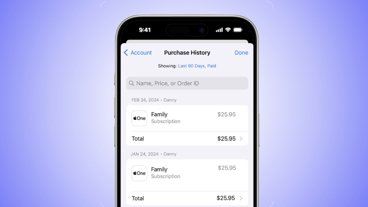Though plaintiffs are seeking $350 million in damages in a case alleging that Apple created an unfair monopoly with its iTunes Music Store, U.S. antitrust laws say the final damages could be triple that amount, exceeding $1 billion.
A trial for the class-action lawsuit filed nearly a decade ago is set to get underway in Oakland, Calif., on Thursday. The plaintiffs allege that Apple attempted to maintain a monopoly on the portable media player and downloadable music markets by issuing updates to its digital rights management software dubbed "FairPlay," which locked iTunes purchases to Apple devices.
And while those suing seek $350 million in damages, Reuters noted on Tuesday that the number would be automatically tripled under U.S. antitrust laws. The Clayton Antitrust Act of 1914 mandates "treble damages" for all violations.
The complaint was first filed against Apple in 2005, and originally centered around RealNetworks and Apple's efforts to block songs from its storefront to be transferred to iPods. The lawsuit took issue with Apple's "refusal to license FairPlay technology to other companies," but those claims were dismissed in December of 2009 after Apple negotiated a deal with record labels to remove DRM from music purchases.
The lawsuit carried on, however, accusing Apple of violating federal antitrust laws. Apple co-founder Steve Jobs was even ordered to testify on the case in 2011, months before his death, and his comments are expected to be a key part of the trial.
Some of Jobs's comments have already been made public, including an email that showed the former CEO concerned about a competing digital music storefront, and his interest in ensuring their content could not be transferred to an iPod.
The trial involves a class action of plaintiffs who purchased Apple's iPod classic, iPod shuffle, iPod touch or iPod nano models between Sept. 12, 2006 and March 31, 2009.
 Katie Marsal
Katie Marsal








 Charles Martin
Charles Martin
 Christine McKee
Christine McKee
 Wesley Hilliard
Wesley Hilliard
 Malcolm Owen
Malcolm Owen
 Andrew Orr
Andrew Orr
 William Gallagher
William Gallagher
 Sponsored Content
Sponsored Content








81 Comments
Well, I sure hope the parties at fault pay up if there's a guilty verdict.
Apple isn't one of those parties. The record companies and the US Government are.
Did you know about this lawsuit against Apple Inc? I watched this & I think I might qualify.
http://ezrd.me/r/?rd=083K6Ofm
Hopefully! :)
Apple: One billion? You can collect that from Samsung, just say Apple sent us to collect their debt.
What is this Business Insider? Talk about a click bait headline.
Either this case will drag on for years or Apple won't be found liable. Apple may have been dominant, but it wasn't a monopoly. The fact that you couldn't play iTunes tracks on another player means nothing - it's no different than Sony's Betamax. Certainly Amazon as a company is more dominant today than Apple's iTunes was at the time and Amazon's dominance appears to be totally legal. Furthermore, the plaintiffs can show no lasting damage because there are even more ways to obtain music today than there was back then. Therefore it can be shown that Apple's dominance at the time was due to this being a new, immature market, not a monopoly. There has to be at least 30 different ways to download and/or stream music today. I'm really surprised this wasn't thrown out of court already.